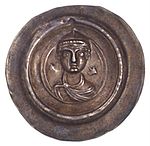Otto (Meissen)
Otto the Rich , (* 1125 ; † February 18, 1190 ) from the House of Wettin was Margrave of Meissen from 1156 to 1190 . He was the eldest son of Konrad I, the great , from Meissen and Ostmark / Lausitz.
Surname
His nickname the rich is not contemporary. During Otto's lifetime, his wife's grandfather, Duke Otto von Ballenstedt, was considered Otto the Rich . It was not until centuries later that it received this nickname because of the rich silver finds near Freiberg .
Life
Otto's father Konrad I renounced his sovereign rights in November 1156 under pressure from Emperor Friedrich Barbarossa and went to the monastery. The subsequent division of the lands led to the division of Wettin power into five lines. Otto, who had claimed the entire inheritance of his father, only got the Meissen mark, lost the Bautzener Land to Bohemia and a lot more. His brothers Dietrich and Dedo received the Ostmark / Lausitz and the county of Groitzsch-Rochlitz. The two youngest Heinrich and Friedrich had to be content with smaller areas, the counties Wettin and Brehna . Politically, Otto did not have a particularly happy hand: the relationship with the ruler remained cool. There was little he could do to counter the development and expansion of the Pleißenland by imperial feudal and servants around Altenburg, Chemnitz and Zwickau. In the Eastern Ore Mountains and at the Dresden Elbe crossing, he lost out to the royal burgraves of Dohna . He took part in the battles against Duke of Saxony Heinrich the Lion at the side of his relative, Archbishop Wichmann von Magdeburg, and his brothers from 1179–1181 , but did not benefit from his defeat.
He recorded successes in the internal expansion of his possessions, where he u. a. Farmers settled in the Erzgebirge foreland. Between 1156 and 1170, he granted Leipzig city rights as the first in the Mark Meissen . In 1176 he founded the St. Nicolai Church as the second city church in Leipzig.
Around 1168 silver was found in the area of the Altzella monastery , founded by Otto, near what is now Nossen on the Freiberg Mulde . He managed to be enfeoffed with the mountain shelf from the ruler . This secured Otto the right to mine all mineral resources in his market. Freiberg , which soon developed into the most important mountain town in the Meißner Land, was created at the site . The rich Freiberg silver deposits led to the founding of the Freiberg and Leipzig mint by the margrave, as evidenced by Otto's representative bracteates .
The end of his life was overshadowed by a serious inheritance dispute within the family. The intention, contrary to previous agreements, to prefer his younger son Dietrich , caused the older Albrecht to capture Otto. Albrecht was supported by his relatives Dedo, Margrave of Ostmark / Lausitz, and his son Konrad . On the orders of Emperor Friedrich I Barbarossas Otto had to be released again, but the loss of reputation of the family was immense and led to a catastrophe as early as 1195.
Burial place
The bones of Margrave Otto the Rich were once buried in the high choir of the house monastery of the Meißner Wettins, in the collegiate church Altzella. Margrave Friedrich II. , The Serious, had it placed in his own burial chapel in 1340, which burned down in 1599. In 1787, Elector Friedrich August III. the rebuilding of the chapel in memory of his ancestors. In 1983 the grave slabs of Otto the Rich, his wife Hedwig von Meißen and both sons were recessed into the ground at the original location in the choir of the collegiate church.
progeny
1147 married Otto Hedwig († 1203), a daughter of the Margrave of Brandenburg Albrecht the Bear . Originated from this marriage
- Albrecht the Proud (1158–1195)
- Adelheid (1160–1211) - married to Ottokar I. Přemysl , King of Bohemia
- Dietrich the distressed (1162-1221)
- Sophia - married to Udalrich II , Duke of Moravia
literature
- Stefan Pätzold: The early Wettins. Noble family and house tradition until 1221. Böhlau-Verlag 1997 ISBN 3-412-08697-5
- Michael Lindner: It's a question of honor. Margrave Konrad von Wettin and Emperor Friedrich Barbarossa. in: In the service of historical regional studies. Festival for Gerhard Billig on his 75th birthday. ed. by Rainer Aurig / Reinhardt Butz / Ingolf Gräßler and André Thieme, 2002, pp. 105–121
- Grave slab of Otto the Rich and burial place of the Wettins in Altzella. in: Helga Wäß: Form and Perception of Central German Memory Sculpture in the 14th Century. Volume 1: A contribution to medieval grave monuments, epitaphs and curiosities in Saxony, Saxony-Anhalt, Thuringia, North Hesse, East Westphalia and South Lower Saxony in two volumes. Volume 2: Catalog of selected objects from the high Middle Ages to the beginning of the 15th century. Bristol et al. a. 2006, vol. 2, p. 27 ff. And cat. No. 5–9 with illus . ISBN 3-86504-159-0
- Heinrich Theodor Flathe : Otto the rich . In: Allgemeine Deutsche Biographie (ADB). Volume 24, Duncker & Humblot, Leipzig 1887, p. 704 f.
- Karlheinz Blaschke: Otto the Rich, Margrave of Meissen. In: New German Biography (NDB). Volume 19, Duncker & Humblot, Berlin 1999, ISBN 3-428-00200-8 , pp. 689 f. ( Digitized version ).
Web links
Individual evidence
- ↑ Wäß 2006, pp. 27 ff. And Cat. No. 5–9
| predecessor | Office | successor |
|---|---|---|
| Konrad I. |
Margrave of Meissen 1156–1190 |
Albrecht I. |
| personal data | |
|---|---|
| SURNAME | Otto |
| ALTERNATIVE NAMES | Otto the Rich |
| BRIEF DESCRIPTION | Margrave of Meissen |
| DATE OF BIRTH | 1125 |
| DATE OF DEATH | February 18, 1190 |

